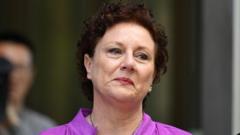Kathleen Folbigg's case has emerged as one of Australia’s most significant miscarriages of justice. After spending 20 years in prison for the alleged murders of her four infants, she has been offered A$2 million (approximately £975,580 or $1.3 million) in compensation—a figure her legal team deems "woefully inadequate."
In 2003, Folbigg was sentenced based on circumstantial evidence, including her diaries, which prosecutors used to portray her as a disturbed mother. However, a 2023 review revealed her children's deaths could be attributed to a rare genetic condition, leading to her release.
Her lawyer, Rhanee Rego, expressed profound discontent over the compensation offer, saying it fails to reflect the gravity of the injustice inflicted on Ms. Folbigg. "The sum offered is a moral affront – woefully inadequate and ethically indefensible," she asserted.
The New South Wales Attorney General, Michael Daley, indicated that the compensation offer followed an extensive review process, although he acknowledged a request from Folbigg that kept specific details private.
Folbigg's situation highlights systemic issues in how the justice system handles cases involving mothers. After her release, calls for higher compensation reflect her suffering compared to others, such as Lindy Chamberlain, who received $1.7 million after a wrongful conviction that lasted just three years in prison.
Experts speculate that Folbigg could reasonably expect upwards of A$10 million due to the extent of her wrongful imprisonment, with some media reports suggesting potential damages could reach A$20 million.
This case continues to stir debate in Australia about justice, gender biases in legal proceedings, and the need for substantial reforms in compensation for wrongful convictions.
In 2003, Folbigg was sentenced based on circumstantial evidence, including her diaries, which prosecutors used to portray her as a disturbed mother. However, a 2023 review revealed her children's deaths could be attributed to a rare genetic condition, leading to her release.
Her lawyer, Rhanee Rego, expressed profound discontent over the compensation offer, saying it fails to reflect the gravity of the injustice inflicted on Ms. Folbigg. "The sum offered is a moral affront – woefully inadequate and ethically indefensible," she asserted.
The New South Wales Attorney General, Michael Daley, indicated that the compensation offer followed an extensive review process, although he acknowledged a request from Folbigg that kept specific details private.
Folbigg's situation highlights systemic issues in how the justice system handles cases involving mothers. After her release, calls for higher compensation reflect her suffering compared to others, such as Lindy Chamberlain, who received $1.7 million after a wrongful conviction that lasted just three years in prison.
Experts speculate that Folbigg could reasonably expect upwards of A$10 million due to the extent of her wrongful imprisonment, with some media reports suggesting potential damages could reach A$20 million.
This case continues to stir debate in Australia about justice, gender biases in legal proceedings, and the need for substantial reforms in compensation for wrongful convictions.
















